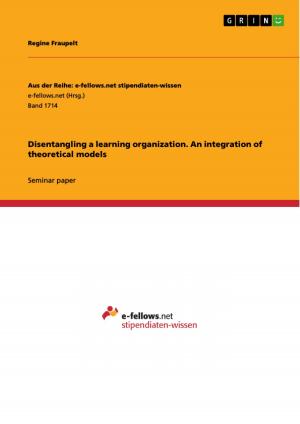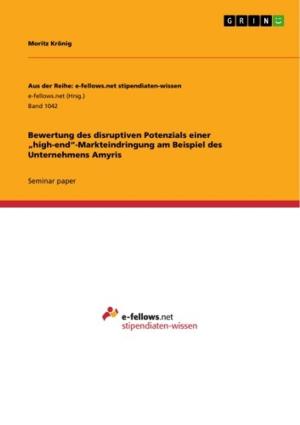Do Microcredits offer a practicable solution for sustainable growth in the economies of developing countries?
Business & Finance, Economics, International| Author: | Jonas Schirm | ISBN: | 9783638480994 |
| Publisher: | GRIN Publishing | Publication: | March 20, 2006 |
| Imprint: | GRIN Publishing | Language: | English |
| Author: | Jonas Schirm |
| ISBN: | 9783638480994 |
| Publisher: | GRIN Publishing |
| Publication: | March 20, 2006 |
| Imprint: | GRIN Publishing |
| Language: | English |
Essay from the year 2005 in the subject Economics - International Economic Relations, grade: A, Anglia Ruskin University, course: International Economic Issues, 15 entries in the bibliography, language: English, abstract: The aim of this essay is to present the purpose and exigency of financial aid for developing countries and new approaches by which financial aid can lead to sustainable growth. More than three-fourth of the world's people live in developing countries, but they enjoy only 17,3 % of the world's income - while the richest 20% have 82,7 % of global income. (IMF 2001)The definition of Less Developed Countries (LDC) is not very precise. The common approach to define a country as LCD is in regarding the economy. A big part of the economic issues are a result of low creation of value (productivity). Due to major parts of inhabitants of LDC being employed in the primary sector, in which economically very little value can be created. The exports are basically generated by the primary sector (i.e. agricultural goods or natural resources). The strong commercial adjustment to industrialised countries has, among of others, its routs in colonialism. Most aid is regulated by the United Nations (UN) which is a world council of different nations. The UN also differs between LCD and LLCD (Least Developed Countries) which are a group of countries within the United Nations Organisation (UNO) which are ever poorer than LCD. Due to relatively unsuccessful efforts to reduce poverty in the past a new idea came up. Unfortunately there is no measurement like return on investment at aid. This essay will show were the problems are and what is done to solve them more sustainable than in the past. One new approach is the usage of Microcredits which I will give details about after explaining the initial position of the problem.
Essay from the year 2005 in the subject Economics - International Economic Relations, grade: A, Anglia Ruskin University, course: International Economic Issues, 15 entries in the bibliography, language: English, abstract: The aim of this essay is to present the purpose and exigency of financial aid for developing countries and new approaches by which financial aid can lead to sustainable growth. More than three-fourth of the world's people live in developing countries, but they enjoy only 17,3 % of the world's income - while the richest 20% have 82,7 % of global income. (IMF 2001)The definition of Less Developed Countries (LDC) is not very precise. The common approach to define a country as LCD is in regarding the economy. A big part of the economic issues are a result of low creation of value (productivity). Due to major parts of inhabitants of LDC being employed in the primary sector, in which economically very little value can be created. The exports are basically generated by the primary sector (i.e. agricultural goods or natural resources). The strong commercial adjustment to industrialised countries has, among of others, its routs in colonialism. Most aid is regulated by the United Nations (UN) which is a world council of different nations. The UN also differs between LCD and LLCD (Least Developed Countries) which are a group of countries within the United Nations Organisation (UNO) which are ever poorer than LCD. Due to relatively unsuccessful efforts to reduce poverty in the past a new idea came up. Unfortunately there is no measurement like return on investment at aid. This essay will show were the problems are and what is done to solve them more sustainable than in the past. One new approach is the usage of Microcredits which I will give details about after explaining the initial position of the problem.















